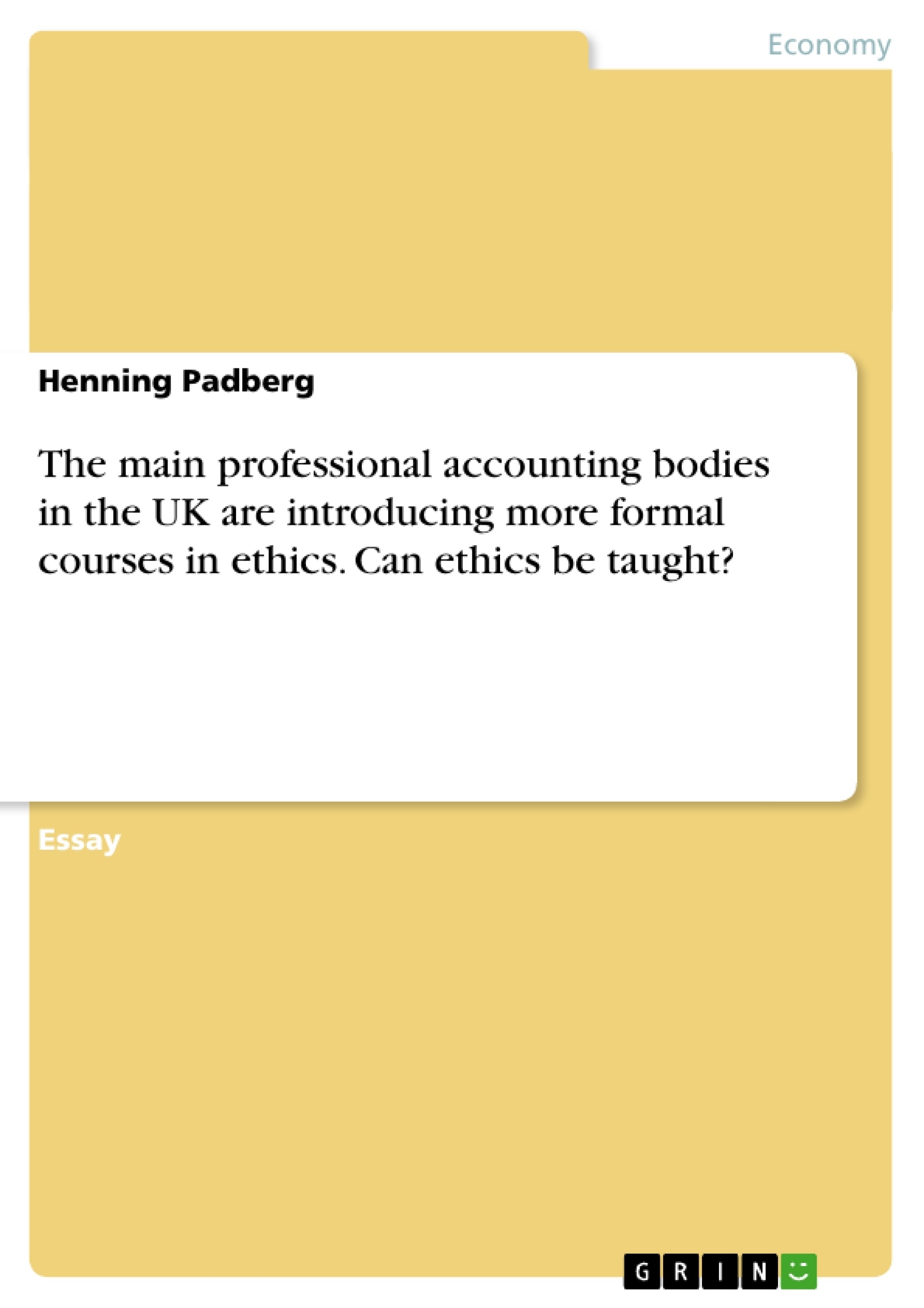Excerpt
1. Introduction into the Topic and the Problem with Ethics
Ethical aspects have been permanently discussed within a wide range of society’s interests which goes back to historical philosophers like Aristotle, Socrates and Plato, but is also on the daily agenda.
What people define whether ethical or not can differ but there are a few objective building blocks which seem to be all-around the same. In simple words one would be considered as an ethical person by living principles like telling the truth, not stealing, and treating others as one would want to be treated. As Charles Tilley, CEO of CIMA, recently mentioned in an interview, “the definition of ethics (for accountants) has never changed. It is about being honest, open and professional”. Ethical deliberations should encourage characteristics like loyalty, honesty, objectivity and integrity.
The professional bodies all define their understanding of ethics in a conceptual framework which is supported by additional guidance. For instance, the ‘ICAS Code of Ethics’ is based on five fundamental principles drawn from the accountants’ duties. Integrity, objectivity, professional competence and due care, confidentiality and professional behaviour are at the core of there principle-based approach.
Ethical principles apply to all aspects of ones life, not only to business in particular. For example the principle ‘one should not steal’ is not only true for personal but also for business life. People believe that both corporate and personal life work better if society agrees with ethical values and that it is beneficial to achieve an ethical culture. Ethics education can teach people to make better decisions, includes the opportunity to strengthen management education, and can help to deal with a changing legal and compliance environment.
The problem simply is that not all people behave ethical or their understanding differs massively from others. In a recent FT interview Avinash Persaud, London School of Economics, hit the nail on the head when he said “People have a sense of right and wrong. It is just that they consider it right to hang it up outside the door with their coats when they come into the office every day”. Also Molyneaux (2004), aiming at the collapse of Anderson, states that “something went catastrophically wrong in practice, even if the accountancy profession tries to implement a high level of ethical understanding in their education”.
Educational institutions are accused of not sufficiently integrating ethics into their curricula; business theory has excised ethics from its calculations so far and Ritter (2006) points out that there is still a great disagreement, both theoretically and empirically, whether ethics can be taught or not. Others argue that the assumption of many educators that the majority of students are being well prepared in this domain is highly questionable.
In general it is a question of external versus self-regulation. Can legislation like the Sarbanes-Oxley Act promote a climate of ethical behaviour or has education a higher impact?
Regulators set guidelines and define what is legal, but there are also things which are not illegal, but unethical. For example when Darleen Druyun asked Boeing to give her daughter and son-in-law a job at Boeing while she was considering awarding them a $4 billion contract in 2000, it was not technically illegal, but it was unethical.1
2. The Role of Education for Developing an Ethical Understanding
Education is probably nor the sole determinant of human behaviour, neither responsible for ethics education in particular. Even if ethics education has always been part of business curricula, Philippe de Woot, chairman of the University of Louvain, observes correctly that “The protagonists of the recent financial scandals in the US were successful students of business ethics in prestigious international business schools. Some even taught business classes.”
Ethical education has its role to play but one must supplement education with enforcement to produce ethical people. Teaching ethics should start earlier than at University or the professional accounting bodies. Parents, teachers and all other parts of society must play a part. It is difficult to ascertain the educational contribution to ethical behaviour because it is influenced by many other factors like culture, religion, socio-political & economic considerations, legislation and ecology.
Scientists come to different opinions. Cragg (1997) argues that ethics can not be taught because the personal character is already formed when students reach college age. He acknowledges a higher sensitivity to moral reasoning if someone is already predisposed with ethical considerations.
Churchill (1982) makes a distinction between ethics and moral values. In his opinion ethics can be taught, while trainability of moral values is questionable.
[...]
1 for more details: http://www.cbsnews.com/stories/2005/01/04/60II/main664652.shtml
- Quote paper
- Henning Padberg (Author), 2007, The main professional accounting bodies in the UK are introducing more formal courses in ethics. Can ethics be taught?, Munich, GRIN Verlag, https://www.grin.com/document/79586
Publish now - it's free






















Comments